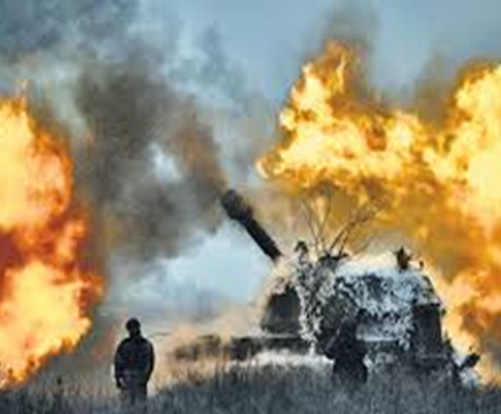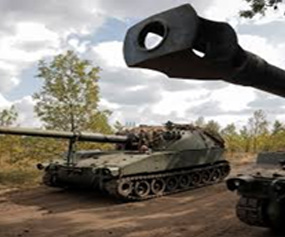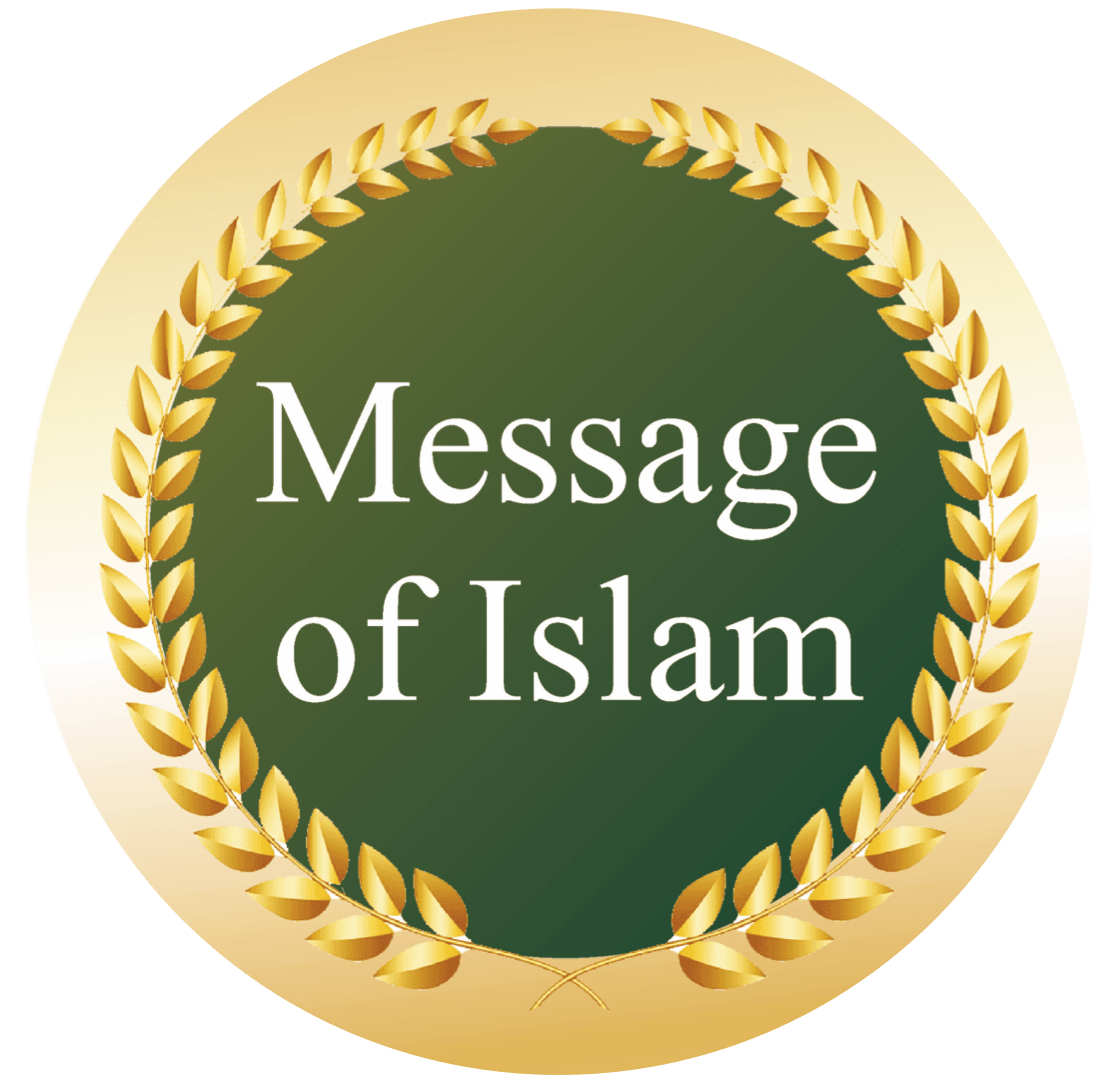By Mohamed Sheikh Hasan, Writer and Publisher
On February 24, 2022, Russia invaded Ukraine in an unprecedented full-scale escalation, which most of the Western world and its supporters described as inhumane mass destruction. The attack was considered an acceleration of the Russo-Ukrainian War that erupted in 2014. It was a declaration of intentional invasion, so that to be a lesson should be learned by the European states that are members of the North Atlantic Treaty Organization. The European continent has almost forgotten the horrors of the First and Second World Wars, where millions lost their lives and livelihoods. They developed solid institutions to prevent any more recurrent wars in the continent. Europe has been enjoying the dividend of peace for the past for over seventy years. Knowing the consequences of the wars, the Europeans realized that they had secured an everlasting peace, and, indeed, the culture of waging wars remained in the history books! However, such an inhumane culture of waging wars and creating instabilities was shifted to Africa and Latin America.
The War in Europe 2022-2023
By Mohamed Sheikh Hasan, Writer and Publisher
European Union (EU) Expansion and the North Atlantic Treaty Organization (NATO) Expansion have been considered the pillars and the guarantors of peace. When the Soviet Union disintegrated and collapsed in the early nineties, Europe had a chance to incorporate Russia into the collaboration of the EU and NATO in order to terminate the hostility chapter of cold warfare once and for all. Regrettably, the United States (US), which controls the peace in Europe and has the first step of the veto power in NATO, seems to be holding unexplained political policies, plans, intentions, and ambitions. They decided to expand NATO and the EU by taking almost all the former Soviet allies into their camp. The fall of the Berlin Wall in November 1989 signaled the end of the Cold War and was followed by the dissolution of the Warsaw Pact, which was also followed by the breakup of the Soviet Union. The reunification of Germany in October 1990 brought the territory of the former East Germany into the Alliance. The new democracies of Central and Eastern Europe were eager to guarantee their freedom by becoming integrated into Euro- Atlantic institutions.
NATO enlargement was the subject of lively debate in the early 1990s. Many
political analysts were unsure of the benefits that enlargement would bring. Some were concerned about the possible impact on Alliance cohesion and solidarity, as well as on relations with other states, notably Russia. Since the Alliance was created in 1949, its membership has grown from 12 founding members to today’s thirty-one members through nine rounds of enlargement, which was during 1952, 1955, 1982, 1999, 2004, 2009, 2017, 2020, and 2023.
Finland became the latest country to join the Alliance on April 4, 2023. Four partner countries have declared their aspirations for NATO membership: Bosnia and Herzegovina, Georgia, Sweden, and Ukraine. Allied leaders also agreed at the Bucharest Meeting in 2008 that Georgia and Ukraine, which were already engaged in intensified Dialogues with NATO, would one day become members. In December 2008, Allied foreign ministers decided to enhance opportunities for assisting the two countries in efforts to meet membership requirements by making use of the framework of the NATO-Ukraine Commission (which has since become the NATO-Ukraine Council) and the NATO-Georgia Commission. Russia, who felt humiliated, defeated, and badly beaten up in the Cold War, told the NATO countries that the accession of Ukraine into the Alliance was a Red Flag that Russia would not accept and take concrete steps to prevent such expansion. Having the NATO Alliance in our backyard threatens our national security! Then, what can a weak and already defeated Russia do? After all, NATO has incorporated all their former Warsaw pacts and former Soviet Allies into NATO. Russia cannot and will not dictate the expansion based on the
conditions of its former Alliances!
Such arrogance is what triggered the current Russian-Ukrainian War. Many academicians, politicians, and military strategists believe Russia has no choice but to call for a cease-fire and initiate talks on the peace process. The Kremlin should stop the war-based project and invalidate its mission by considering it a failure and unnecessary. Similarly, there are many political and War analysts, mainly those who live in the West, who view the decision to wage War against Ukraine as no more than a unilateral resolution exercised by Russian President Vladimir Putin. They also argue that NATO’s 2008 decision of Ukraine’s membership to NATO was intentionally taken, even though it was apparently leading the world to a conflict as it is an existential threat to Russia’s borders. They could also envision that it could create a conflict that brings back the same disaster as those of World War One and Two or, at least, that of the Cold War. Thus, the decision was taken ruthlessly by the Western world. They ignored or belittled the need to tie consistent cooperation with Russia and miscalculated Russia’s powers and positions militarily, economically, politically, geographically, and population-wise.
On the other hand, it seems that the decision taken in April 2008, which led to Ukraine and Georgia falling into NATO’s Alliance, was misconstrued as it made both countries prey to Russia’s ruthless missiles. The Bush administration was the principal architect of the choice. However, the administrations headed by President Obama, Trump, and Biden administrations have doubled down on that policy. As a result, every turn of America’s allies have dutifully followed Washington’s lead. Even though Russian leaders made it clear that bringing Ukraine into NATO would be crossing “the brightest of red lines,” the United States refused to accommodate Russia’s deepest security concerns and instead moved relentlessly to make Ukraine a Western embankment on Russia’s border. Russia is the world’s largest country, spanning nine time zones, and is home to 176 different ethnic groups speaking 137 different languages. President Biden’s administration seemed unwilling to avoid that threat through diplomatic discussions. Once more, in 2021, the United States insisted on its commitment to bringing Ukraine into NATO. Putin responded to the matter by condemning the invasion of Ukraine on Feb. 24, 2022.


Courtesy-Hindustan Times, Courtesy-Aljazeera
On February 24, 2022, Ukrainian civilians unexpectedly awoke to the sounds of shelling and non-stop explosions. The abruptly erupted bombardment was Russian President Vladimir Putin’s order to invade Ukraine. The invasion is based on the false and damaging pretense of ‘de-Nazification,’ a term used by the Kremlin for political purposes to justify an offensive against an independent country. The administration of President Biden reacted to the outbreak of War by doubling down against Russia by siding with Ukraine. Washington and its Western allies have been committed to decisively defeating Russia in Ukraine by employing comprehensive sanctions to weaken Russian military influence significantly. The United States is not seriously interested in finding a diplomatic solution to the War, which means the War will likely drag on for many more years to come. In the process, Ukraine, which has already suffered grievously, will experience even more significant harm in the coming months and years. There is a danger that the War will escalate, as NATO has been dragged into aggressive conflicts in which Russia might use nuclear weapons if it feels that it is losing the War. There, if
Russia feels its existence is under threat, the existence of Europe may be at stake, too.
Food Security and World Economy As a result of the War
The Russian-Ukrainian War has devastated the world’s food market since both countries control nearly 30% of the world’s wheat and grain. Many poor countries in Africa and Asia mainly depend on the grain imported from these two countries. Since the beginning of the War, wheat prices have tripled and quadrupled. The poor nations are paying the highest price for a war they have nothing to do with. They are doomed to suffer! Lower-income countries worldwide have also suffered due to spikes in food and energy prices, exacerbated by trade restrictions in response. Resources channeled to Ukraine or hosting refugees have also been diverted away from other needy countries.
Another major impact and setback brought by the War is the influx of Refugees into continental Europe. An ongoing refugee crisis began in Europe in late February 2022 after Russia invaded Ukraine. As of June 2023, 8,177 Million citizens of Ukraine stayed abroad. It is about 20% of the country’s population before February 24, 2022. The data comes from the Ukrainian Ministry of Foreign Affairs, while an estimated 8 million others had been displaced within the country by late May 2022. Some countries have been forced to step up by receiving refugees, with almost a third of the total across the 40 countries coming from Ukraine. Czechia, Poland, and Slovakia have each increased their hosting of refugees by over 100-fold since before the War, with the first two now surpassing Germany and Greece for the number of refugees hosted relative to the size of their populations.
Turkey deserves the best credit for hosting Syrian refugees, with over 42 refugees hosted per 1,000 population. A burden on its flimsy and weak economy at the same time, Turkey has demonstrated a good heart and a mature policy to host over 4+ million refugees, mainly from Syria. Since 2014, the European Union has applied eleven sanctions against the Russian Federation. The last 11th round of sanctions in June 2023 focused on dual-use items such as computer chips and an attempt to limit ship-to-ship transactions of sanctioned goods. Central Russian banks have also been removed from the international financial messaging system Swift. Countries continuing to trade with Russia have sought ways around this. China and India increasingly purchase oil and gas in their local currencies. India, China, and Turkey all ramped up their purchases of Russian oil last year – and together, they now make up 70% of all Russian crude flows by sea. Russia offered its oil at a significantly lower price than the global benchmark Brent crude.
At the start of 2022, Russia supplied less than 2% of India’s oil imports, but it is now on course to become its largest single supplier. China’s imports of Russian oil have fluctuated but have also risen over the past year. It is essential to mention the colossal consequences of the War on the Ukrainian economy. In March 2023 (prior to the destruction of the Kakhovka Dam), a joint assessment was released by the Government of Ukraine, the World Bank, the European Commission, and the United Nations, estimating the total cost of reconstruction
and recovery in Ukraine to be $411 billion USD (€383 billion). Depending on the War’s course, this could eventually exceed $1 trillion (€911 billion).
The G7 countries plus the European Union announced in May 2023 that the approximately $300 billion (€275 billion) in Russian assets that had been frozen in these countries would remain frozen “until Russia pays for the damage it has caused to Ukraine. By late July, the amount of frozen Russian assets held in these countries was estimated at $335 billion (€300 billion). Most frozen assets, by far, reside in Europe. Josep Borrell said he wants EU countries to confiscate the frozen assets to cover the costs of rebuilding Ukraine after the War. Russian Deputy Foreign Minister Alexander Grushko remarked that Borrell’s initiative amounted to “complete lawlessness” and said it would hurt Europe if adopted. Austrian Foreign Minister Alexander Schallenberg warned that confiscation of Russian assets that do not have a “watertight” justification would be an “enormous setback, and basically a disgrace” for the EU.
In Conclusion, very few diplomatic initiatives exist to end this horrible War. The US, EU, Ukraine, and NATO are doubling down to defeat and humiliate Russia at every cost on one side and a cornered Russia fighting for its survival and existence on the other. So far, the best and most viable diplomatic initiatives have been taken by Turkey, which has shown a level of political Maturity. They hosted several mediation efforts between the Russian and the Ukrainian delegates in 2022-2023. They succeeded in the black Sea Grain initiative, a Major player in the global grain market. On July 22, 2022, a landmark agreement was brokered with the mediation of Türkiye and the UN. In this agreement, Russia and Ukraine would facilitate grain exports from both countries to global markets. Central to this agreement was establishing a secure maritime route in the Black Sea – traversing the Bosporus Strait in northwestern Turkey – that would ensure the safe transit of grain shipments to and from Ukrainian ports. This agreement was in effect for nearly a year but was later canceled by Russia when it was time to renew the contract. Russia accused Ukraine and the West of not honoring the contract. Finally, the Diplomatic solutions and the possibility of reaching an everlasting peace in Europe are as far and dim as ever. Indeed, a very gloomy picture is waiting for Europe in the near foreseeable future. Only time will tell how this dangerous journey will end.
1The War was going on when this article was prepared in September 2023. Mohammed SH. Hassan (Author & Publisher Toronto). References: Multiple sources on the Internet Article (Analysis) by John J. Mearsheimer June, 2022 article (Analysis) by JOSEPH S. NYE, JR.

